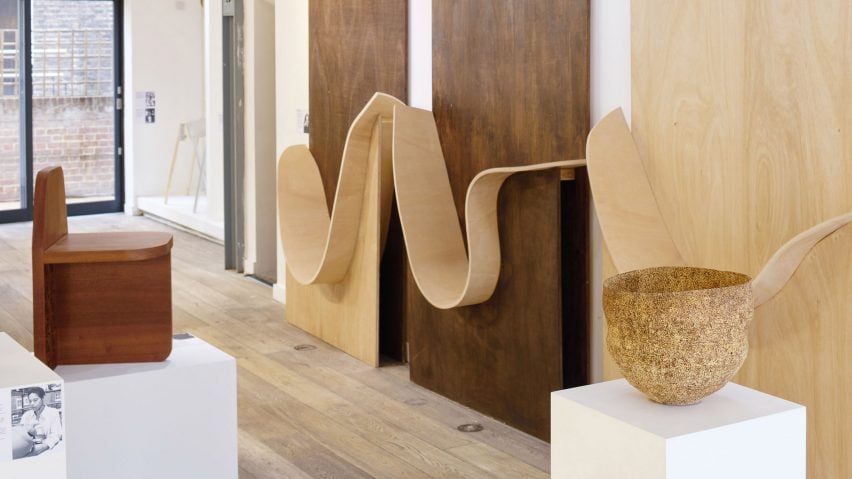Chairs informed by Nigerian mythology and modernist-style floor lamps were among the objects displayed at an exhibition organised by social enterprise POOR Collective to raise the profile of young designers at this year's London Design Festival.
For the second year in a row, POOR Collective's Powershift exhibition provided a platform for designers who would otherwise struggle to showcase their work during the annual design week.
Short for Power Out of Restriction, the initiative focuses on empowering young people and giving them opportunities to impact their environment through small-scale architecture and design projects.
The exhibition included work by a number of young creatives who have a background in one discipline but have recently chosen to explore an alternative field.
Examples included fashion designer Shanti Bell, who developed a series of benches with moulded plywood seats that evoke fabrics formed around the body, as well as a vessel by international relations graduate Bisila Noha that expresses movement in clay.
"We're primarily a design practice but we also look out for other ways that we can champion young designers," explained POOR Collective co-founder Shawn Adams.
"Each of the participants in the Powershift exhibition is taking skills and knowledge from working in one discipline and applying that to something completely different."
Giles Tettey Nartey, who also showed work at Powershift last year, presented a low table in ebonised oak that features bumps, marks and indents intended to evoke scarification and the imprints that make each person's body unique.
Interior designer Dean Connell developed a collection of handcrafted furniture including a pair of upholstered armchairs that were shown alongside an arching LED floor lamp with wooden weights by product designer Joe Slatter.
Slatter also contributed a pair of minimalist salt and pepper mills made from Himalayan rock salt and lacquered sapele wood, while designer Andu Masebo showed two incense holders comprising blackened steel tubes that were cut in half lengthways so they rock gently back and forth.
Rather than providing a theme or brief for the objects, POOR Collective sought to include as many different projects as possible and adopted a collaborative approach to determining how the space should look.
"Everyone in the show understood that we're all colleagues working together and that this was an opportunity for them as well as for us to reach a new audience," added fellow POOR Collective co-founder Ben Spry.
Several of the pieces in the exhibition referenced traditional African motifs and craftsmanship, such as Richard Adetokunbo Aina's chairs inspired by the regal seats of the Gurage people in Ethiopia and Myles Igwebuike's Njiko Stool, which features intricate geometric patterns informed by Igbo mythology from Nigeria.
Other participants looked to explore materials or processes that are new to them, including Teshome Douglas-Campbell, an architectural designer who showed a painting and a clay vase decorated with a smiling face.
"This piece explores the functionality of a vase and tries to use the vase as a vessel for happiness rather than flowers," the designer explained.
Woodworker Darren Appiagyei developed a painstaking technique for applying patterns to timber vessels using a pyrographic machine that burns tiny marks onto the surface, while design studio Mitre & Mondays presented trestle tables created during an after-school club for teenagers organised by design collective Store Projects.
Also featured in the Powershift exhibition were works by designer Akmaral Khassen, textile artist Elfreda Dali, painter Georgie McEwan, artist Ibiye Camp and architect Kuda Mushangi.
The show was part of the Brompton Design District programme curated by Jane Withers Studio.
During the week-long event, the space hosted a series of activities including a lino printing take-over by the Muslim Sisterhood and talks by some of the contributing designers.
"We wanted to make the space work really hard in order to deliver the most value for our community," Spry pointed out. "London Design Festival only happens once a year so this was a great platform to benefit and engage with as many people as possible."
POOR Collective was awarded the Emerging Design Medal at London Design Festival 2023 for its recent impact on the city's design scene.
To mark this achievement, Dezeen spoke with Adams about eight of the group's key projects, including a mural outside a boxing gym in southwest London and a pavilion co-designed with pupil from Mayesbrook Park School.
All photography is by Valdis Bicevskis unless otherwise stated.
London Design Festival 2024 took place from 16-22 September 2024. See our London Design Festival 2024 guide on Dezeen Events Guide for information about the many other exhibitions, installations and talks taking place throughout the week.

